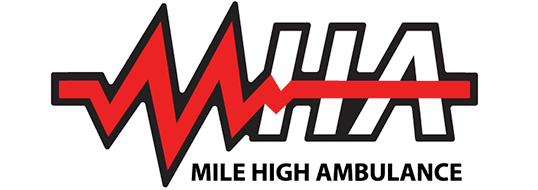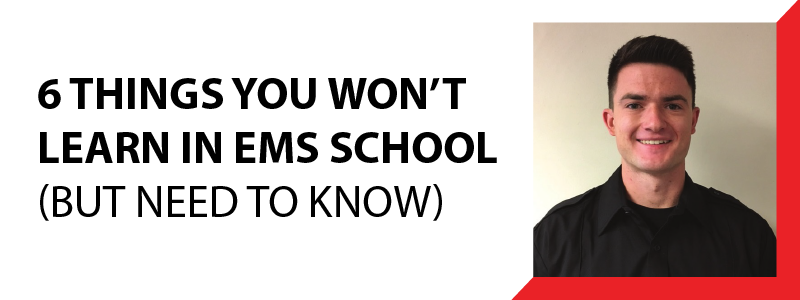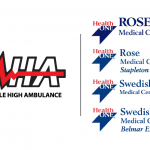6 Things You Won’t Learn in EMS School
This blog post was written by Collin Heller, an EMT-B at Mile High Ambulance in an effort to help his fellow colleagues. We thank him for sharing this well-written article!
6 Things You Won’t Learn in EMS School (but Need to Know)
There is always more to be desired from EMT school; whether it be wanting stronger assessment skills, stronger vital-taking skills, or knowing medication doses like the back of your hand. No matter what school you go to, there will be some things looked over and some things done more in-depth than other schools. It does not matter what school you go to, to quote a wise man, “You get out of it what you put into it.” If you went to “the best EMT school” around it doesn’t matter, you can’t ride on the coat-tails of your school’s success, you must prove that you are a good provider. Here are some things not taught in school that everyone should learn with experience.
-
Being Salty Does Not Make You a Better Provider
We’ve all seen it, the medic who’s been doing this for way too long. They’ve seen it all and you’ll never have it as bad as they did; uphill to the call, 5 miles, in the snow. As a young, impressionable student or new EMT, you no doubt have seen this and thought, “Wow, they’re good at their job, I want to be like that.” So quickly, the new EMT emulates the attitude of the experienced medic since they can’t emulate the success that the medic has been a part of, yet. This new EMT treats their patients the way they hear people talking back at the station, not yet understanding that the conversations they hear at the station are not how patients, family members, and facility staff are actually talked to. It’s simply what the medic wanted to say but knew better than to actually say it. There will be times in your career that you want nothing more than to yell at a patient, family member, or facility staff… don’t. The best providers I have ever met are the kindest people, even after working in a dedicated 911 system in a bad part of town for over 15 years.
-
Know when to be Aggressive
“Be aggressive! B-E aggressive! B-E A-G-G-R-E-S-S-I-V-E! Be aggressive!” – Whether it be about patient care, treatment options, or scene presence, be aggressive. Aggressiveness when it comes to patient care and treatment options can be a double-edged sword; you want to provide the best treatment for your patient without over-treating, but you don’t do your patients any favors by just being an expensive cab ride. Aggressiveness when it comes to scene presence can be tricky, how do you demand respect while also being kind and compassionate? It’s difficult. Be confident in your treatment options, maintain eye contact, but most importantly exude confidence. There’s nothing wrong with having the “testicular fortitude” to stand up for the treatments that you deem appropriate while also not letting that big head of yours overlook things and consider input from your partner. Just because you show up in a big box with flashing lights doesn’t mean people will immediately respect you, you must demand it.
-
Dealing with Difficult Situations
Here we go again, call it resiliency, mental fortitude, or whatever. It’s a topic that is seemingly always talked to death. If it’s talked to death; then why is it that so many people struggle? Almost everyone has heard, “You’re gonna see some messed up stuff on this job.” And then that is promptly followed with them telling you to not let the bad stuff get in. In EMS, we focus on the bad, we look for the bad in our patients because it’s our job to fix it. Problem being, once we get used to that, we focus on the bad in all aspects of life. It isn’t just the big traumas or the cardiac arrests that will wear down your moral. It’s the constant attitude of negativity. The constant disrespect from facility staff, patients, and family members that will wear your psyche if you let it. In a perfect world, I could tell you to be positive, but it’s rarely that easy. Start with your partner on the rig, “Good job on that IV, it really helped me focus on my treatment plan.” Cheer for each other, you’re only as strong as your weakest link. You can constantly razz the EMT who can’t start a line to save their life, but if you don’t try and teach them they can never get better.
-
We Do Not Practice Punitive Medicine
This should go without saying. If you want to punish people get out of this job. This is a personal peeve of a lot of folks, myself included. There is no better way to make me never trust you as a provider or distrust your medical practices than if you practice punitive medicine. “We slammed 2 of Narcan on this last guy, you should’ve seen the amount of puke.” Or, “This guy was being an asshole so we started a 14G.” There is no room for that blatant lack of professionalism in this job. No matter how rude your patient is, they are still a person. They are still someone’s daughter, son, mom, dad, etc. If you think it’s funny then I hope nobody ever runs on a family member of yours with that attitude.
-
You Can’t Help Everyone
I’m not talking about the trauma COR that you couldn’t get pulses back on, no matter how much you wanted to. It’s not the pediatric suicide that you desperately want to work despite your best judgment telling you that there’s no reversing rigor mortis. It’s not the DOA on the highway that you wish had the better judgment to not text and drive because his toddler was in the back seat. It’s the diabetic frequent flyer that refuses to manage his insulin no matter how many times you’ve woken him up. It’s the guy with a peanut allergy that just wants to try peanut butter. These are the people that you still try to help, but for them, it’s easier to live like they don’t have a disease or ailment than to comes to terms and deal with it. No matter how hard you try, and you should try your best every time, you can’t convince this person to change their lifestyle. Don’t let it get personal, and don’t blame them. When the cure is more frustrating than the disease, patients may wonder if it’s worth it.
-
The Little Things Really Do Matter
It’s why almost all of us got into the field of emergency services. We want to help people, we genuinely care about them. I never once have viewed myself as a hero, I seldom have made a real impact on someone’s life. It’s getting down on your knee, or even lying on your back so you can make eye contact with your patients. It’s the subtle, more intimate, pats on your patient’s hand that really make the difference, and lets them know you care. Treat your patients with respect, even the rude ones that don’t reciprocate that respect. Just because you didn’t do a major medical intervention doesn’t mean you didn’t help. The best providers, the ones we should all look up to, are the ones with the medical know-how and the patient rapport. I’m no hero, but I’ve worked with a few.
-Collin Heller EMT-B








This is great. Do you mind if we use it in our next team meeting?
Yes please feel free to!